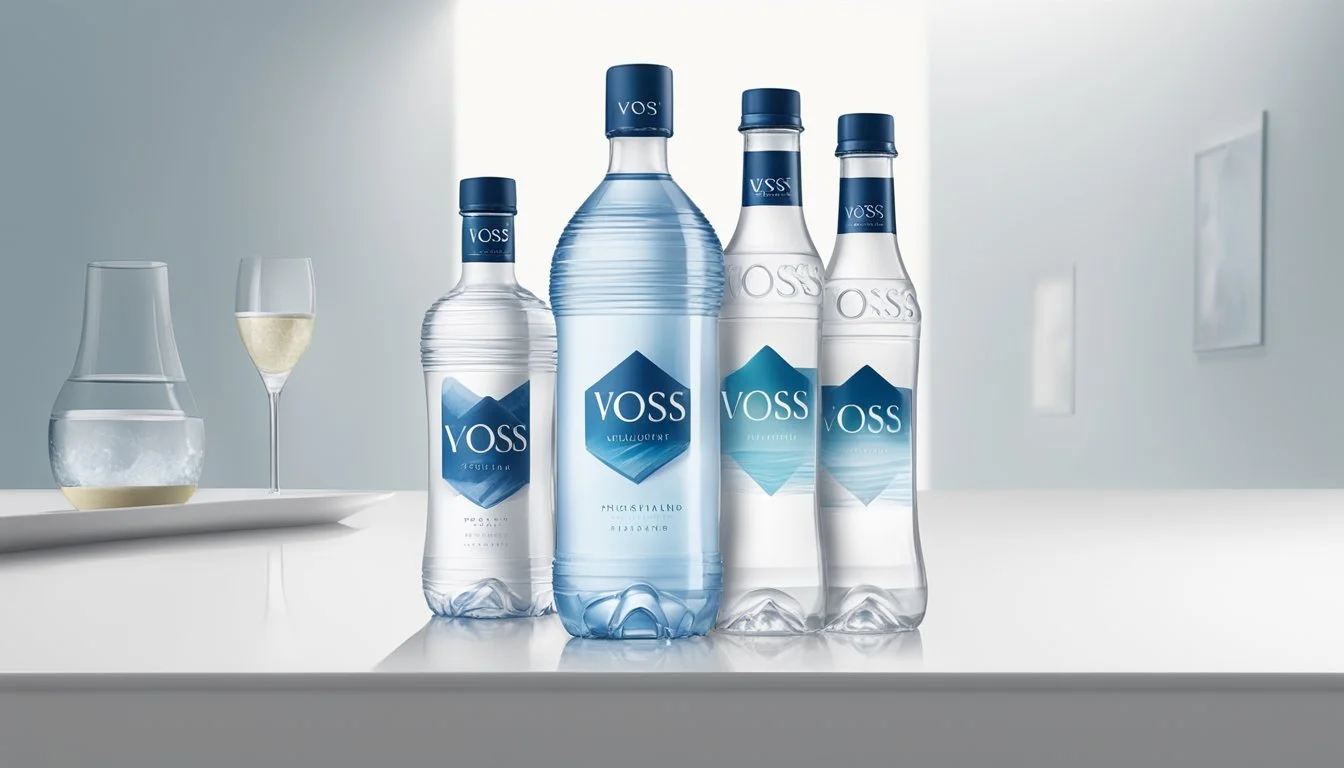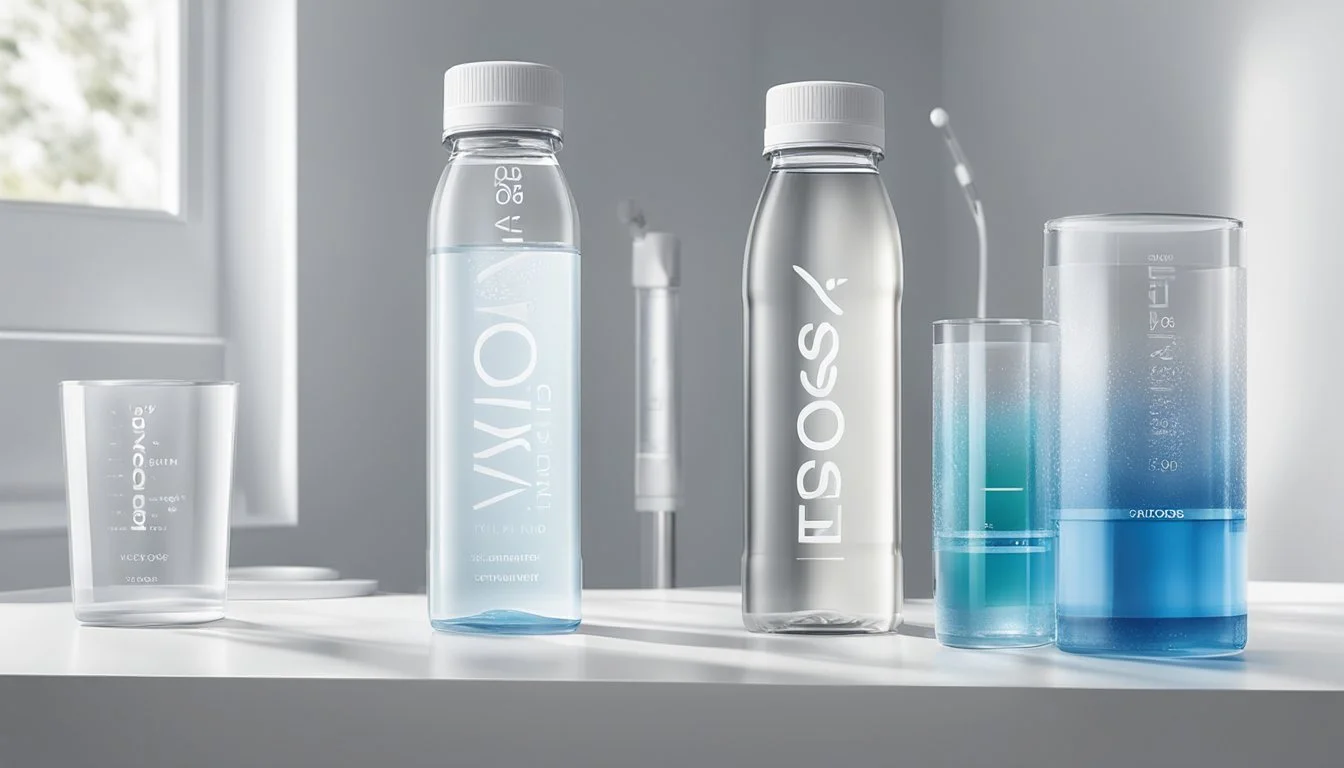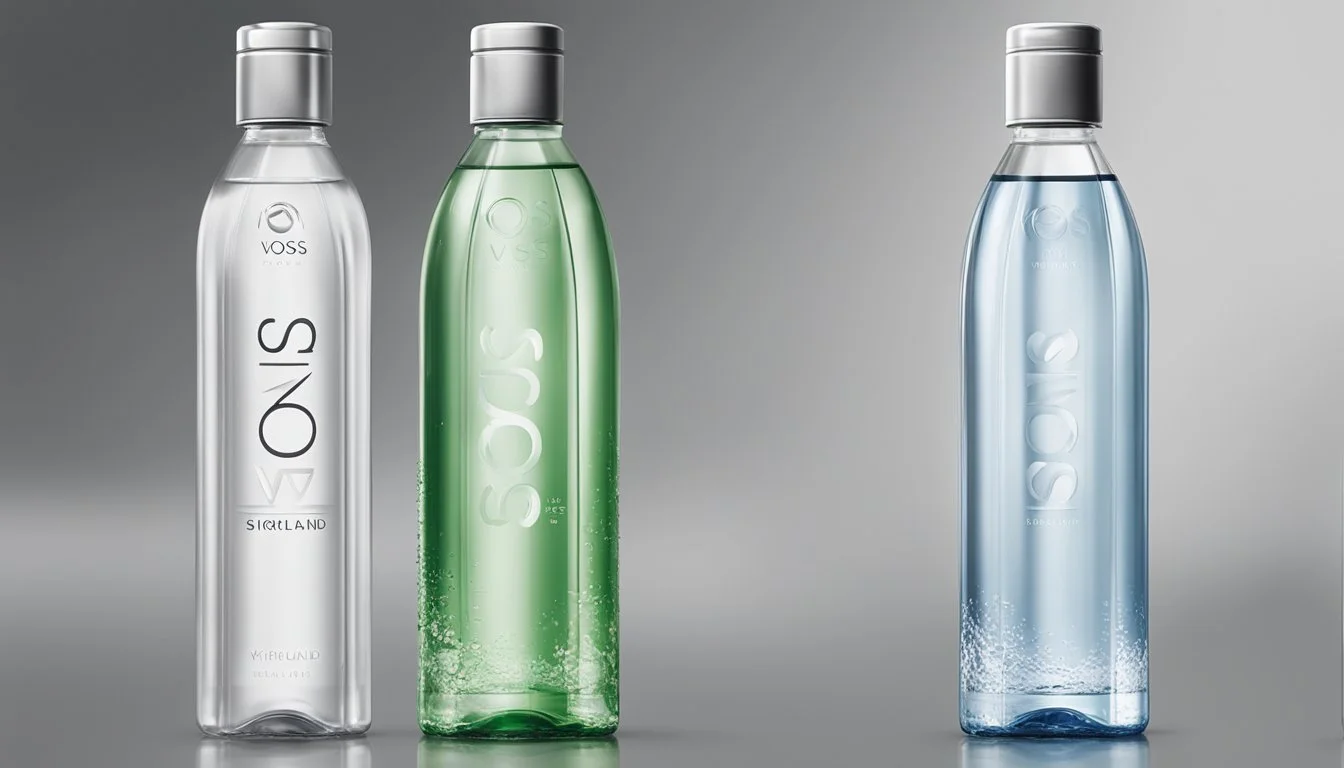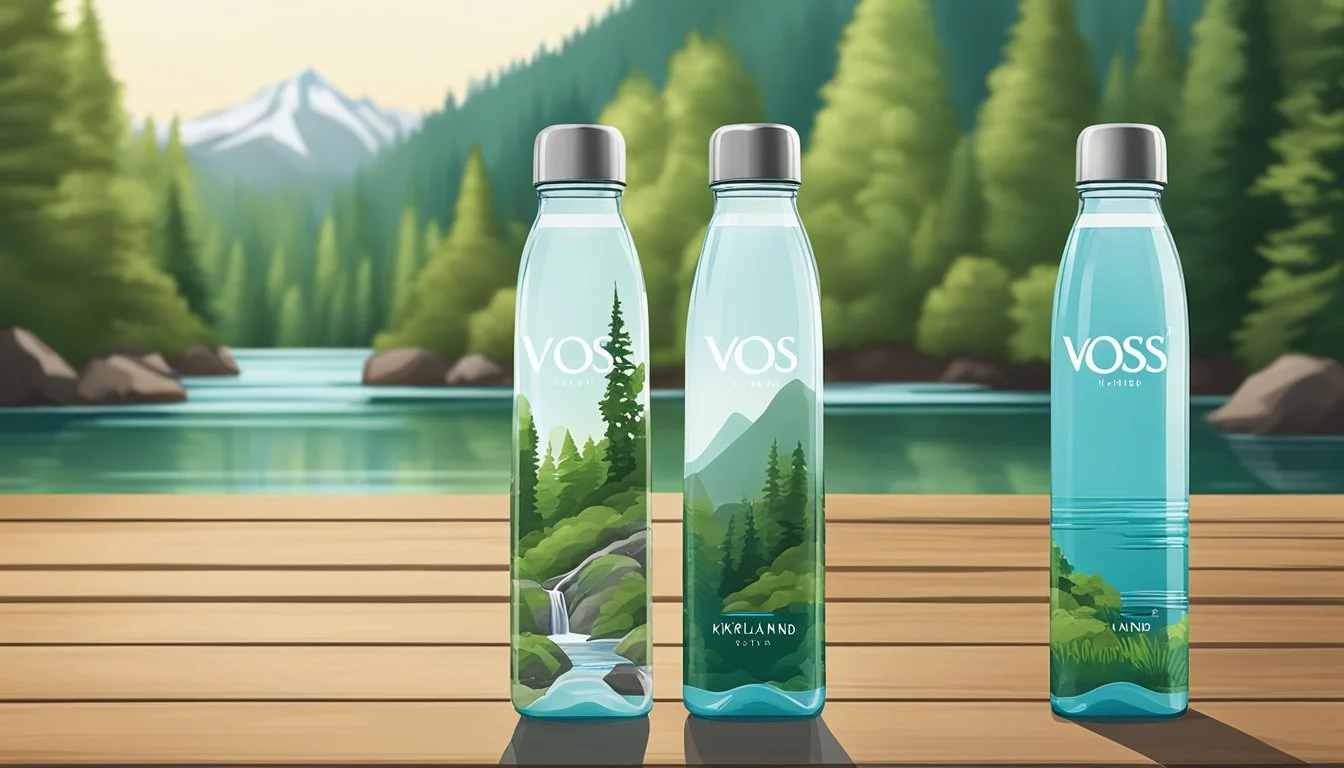Voss vs. Kirkland Signature
Which Bottled Water is Better for You?
When it comes to selecting the best bottled water, Voss and Kirkland Signature are two prevalent choices among consumers. Voss is often recognized for its high-end branding and sleek bottle design. It sources its water from an artesian well in Norway, noted for its purity and distinctive, clean taste. In contrast, Kirkland Signature offers a more budget-friendly option while still providing quality hydration, sourced from various springs in the United States.
For those prioritizing taste and aesthetic, Voss often comes out on top with its premium feel and smooth, crisp flavor. Kirkland Signature, offered by Costco, appeals to those looking for a reliable, everyday option that won’t break the bank. The versatile availability in bulk makes it a favorite for large families or office use.
Ultimately, the decision between Voss and Kirkland Signature depends on what the consumer values most in their bottled water—whether it's the luxury experience of Voss or the practical affordability of Kirkland Signature. Both brands serve as excellent hydration solutions but cater to different needs and preferences.
The Evolution of Bottled Water
The history of bottled water dates back to the 18th century when the first commercial bottling occurred at naturally sourced springs in Europe.
Bottled water began as a luxury item, often enjoyed by the wealthy in spa towns.
Natural Spring Water became a popular choice due to its origin from natural springs, believed to have health benefits.
Purified Water emerged as advances in filtration and purification technology made it possible to treat tap water. This made bottled water more accessible to the general public.
Artesian Water is sourced from confined aquifers. The pressure from the surrounding layers of rock helps bring the water to the surface naturally.
The introduction of Mineral Water, which highlights its mineral content, became a trend for those seeking water with additional health benefits.
Sparkling Water gained popularity with its added carbonation, offering a fizzy alternative to still water.
The International Bottled Water Association played a significant role in standardizing the industry, ensuring quality and safety regulations were met.
Over the years, environmental concerns about plastic waste have led to increased demand for glass bottles and eco-friendly packaging.
Today, the market offers a diverse range of bottled waters to cater to various tastes and health preferences, reflecting its dynamic evolution.
Understanding Water Quality and Standards
Water quality is assessed based on factors such as pH and mineral content as well as the presence of potential contaminants like heavy metals. Understanding these aspects is crucial to determining the safety and health benefits of bottled water.
pH and Mineral Content Analysis
The pH level of bottled water can affect both its taste and its potential health benefits. A balanced pH is typically around 7, which is neutral, but various waters range from slightly acidic to slightly alkaline. For instance, some waters contain minerals like potassium chloride and calcium, which can contribute to a higher pH and offer additional health benefits.
Electrolytes such as these minerals are essential for bodily functions. A water brand high in minerals can be beneficial, especially for people who engage in regular physical activity.
Assessing the Presence of Contaminants
Contaminants such as lead, arsenic, and other heavy metals are a significant concern for water quality. Regulatory bodies like the FDA set strict limits for these substances in bottled water to ensure safety. The presence of PFAS chemicals, which have been found in some carbonated waters, are also closely monitored.
Testing for these contaminants helps to make sure the water is safe to drink. Brands must regularly conduct quality tests to comply with safety standards. Hence, understanding the type and concentration of contaminants present can provide a clearer picture of the water's safety and health implications.
Comparing Voss and Kirkland Signature
Voss and Kirkland Signature bottled waters each bring unique qualities to the table. They differ in terms of source and origin, packaging materials and environmental impact, and taste profile and consumer preferences.
Source and Origin of the Water
Voss artesian water is sourced from an underground aquifer in southern Norway. The water is naturally filtered and has a clean, fresh taste attributed to its pristine origin.
Kirkland Signature water is typically sourced from municipal supplies and undergoes additional purification processes like micro-filtration and distillation. This results in a consistent product but may lack the unique regional characteristics found in artesian waters like Voss or Fiji natural artesian water.
Packaging Materials and Environmental Impact
Voss is known for its iconic cylindrical glass bottles, which appeal to consumers seeking a premium experience. The brand also offers plastic water bottles for on-the-go convenience. Glass bottles are often preferred due to their environmental benefits, as they are reusable and more easily recyclable.
Kirkland Signature primarily uses plastic water bottles, which are lightweight and cost-effective. However, plastic packaging has a higher environmental impact due to issues like BPA and recycling challenges. Consumers looking for eco-friendly options may lean towards Voss's glass bottles.
Taste Profile and Consumer Preferences
Voss has a smooth mouthfeel and crisp finish, attributed to its artesian source. Consumers often describe its taste as pure and refreshing, with minimal mineral content that allows for a neutral palate experience.
Kirkland Signature also boasts a clean taste, a result of its purification process. However, it may not stand out as much in taste tests compared to high-end artesian waters. Taste preferences can be subjective, but many appreciate Kirkland Signature for its consistency and value.
By focusing on source, packaging, and taste, consumers can make an informed choice between Voss and Kirkland Signature based on their priorities.
Health and Hydration Factors
When evaluating Voss and Kirkland Signature bottled waters, it's key to assess their impact on health and hydration.
Hydration: Both waters effectively hydrate the body. Voss, sourced from artesian wells, is noted for its purity. Kirkland Signature, widely distributed through Costco, also ensures adequate hydration.
Electrolytes: Neither brand specifically markets added electrolytes. Electrolytes like sodium, potassium, and magnesium are critical for bodily functions. Consumers seeking enhanced hydration may consider brands with added electrolytes.
Alkaline Water: Voss has a pH level around 6, which is slightly acidic. Kirkland Signature's pH level varies but is generally neutral to slightly alkaline. Alkaline water proponents argue it can balance body pH, although scientific evidence is mixed.
Factor Voss Kirkland Signature Source Artesian wells Varied sources pH Level ~6 (slightly acidic) Neutral to slightly alkaline Electrolytes None added None added
Taste and Preference: Voss provides a clear, neutral taste that many prefer for its minimalism. Kirkland Signature's taste is generally agreeable but varied based on sourcing.
Both brands deliver reliable hydration, with minor differences in pH and taste catering to personal preferences.
Brand Histories and Market Positions
Voss and Kirkland Signature represent different ends of the bottled water spectrum, with Voss focusing on luxury and Kirkland Signature delivering affordability through Costco's private label.
Voss: The Luxury Hydration
Voss is known for its premium image and sleek, cylindrical glass bottles. Originating from the pristine springs in Iveland, Norway, Voss positions itself as a high-end, artisanal brand.
Voss markets its water as pure and refreshing, often found in upscale restaurants, hotels, and Whole Foods. Endorsements from celebrities and a strong presence in the hospitality industry bolster its luxe image.
The company focuses on sustainability, using both glass and BPA-free plastic bottles. While Voss's price point is higher compared to other bottled waters, it leverages this as a mark of exclusivity and premium quality.
Kirkland Signature: The Affordable Choice
Kirkland Signature is the private label of Costco, a global wholesale retailer. The brand offers bottled water sourced and bottled by Niagara Bottling, known for its rigorous purification processes.
Kirkland Signature provides a cost-effective option without compromising quality. The water is widely available and has become a trusted choice for consumers seeking value.
Affordability and convenience are Kirkland’s key selling points, often sold in bulk quantities at competitive prices. This has made it a popular choice among families and businesses, reinforcing Costco's reputation for quality and reliability.
Together, Voss and Kirkland Signature illustrate the diverse options available in the bottled water market, each catering to different consumer needs and preferences.
Processing and Purification Techniques
Voss and Kirkland Signature bottled waters employ different methods for ensuring the purity and safety of their products. Each brand uses unique techniques for filtration, UV exposure, and quality assurance during bottling.
Filtration and UV Exposure
Voss sources its water from an underground aquifer in Norway. It undergoes a meticulous purification process that includes several filtration stages. This water is then exposed to ultraviolet (UV) light to eliminate any potential microbial contaminants without altering the taste.
Kirkland Signature primarily uses municipal sources. Their water undergoes reverse osmosis (RO), which is a comprehensive filtration method that removes impurities and contaminants. They also use UV light to ensure bacterial and viral pathogens are neutralized, ensuring the water remains safe and clean.
Bottling and Quality Assurance
For bottling, Voss uses high-quality glass containers to preserve the integrity and taste of the water. The bottling process is handled with stringent quality controls to maintain the standard of purity.
Kirkland Signature uses BPA-free plastic bottles, which are both safe and practical for consumers. Their bottling facilities also incorporate ozone treatment to keep water fresh and pathogen-free before sealing. Quality checks are conducted routinely to ensure consistency and safety.
Consumer Insights and Purchasing Behaviors
Consumers often have varying preferences when it comes to choosing bottled water. Factors influencing these choices include taste, price, and brand loyalty.
Top water brands like Voss and Kirkland Signature have distinct consumer bases. Voss, known for its sleek design and perceived luxury, tends to attract individuals who prioritize brand prestige and aesthetics. Many consumers feel that Voss offers a "premium" experience.
In contrast, Kirkland Signature, a brand by Costco, is favored by consumers looking for value and quality. It is frequently chosen by families and bulk buyers due to its competitive pricing and reliable quality. Unlike Voss, which may be seen as a statement product, Kirkland appeals to practicality.
Taste plays a crucial role in consumer behavior. Taste tests often reveal that preferences can be highly subjective. Some consumers find Voss’s water to be exceptionally crisp and clean, which aligns with its high-end branding. Kirkland's taste is described as mild and pleasing, which works well for everyday consumption.
An investigative journalist or writer covering the bottled water market often highlights the different marketing strategies. Voss uses its premium image to justify higher prices, while Kirkland focuses on cost-efficiency and broad distribution.
Water brands are constantly evolving. Consumers are becoming more aware of factors like sustainability and ingredient transparency. Brands that can balance these with taste and pricing tend to retain customer loyalty.
Understanding these purchasing behaviors is critical for any brand looking to capture or expand its market share. Preferences may shift, but the emphasis on taste, price, and brand image remains constant.
Sustainability and Ethical Considerations
Voss Water utilizes glass bottles and recyclable plastic options, signifying a commitment to reducing plastic waste. This aligns with their focus on environmental impact. The use of glass bottles is notable for their reusability, making them an eco-friendlier option.
Kirkland Signature emphasizes value but also invests in recyclable plastic bottles. Their large-scale production might raise concerns about the sustainability of water sources and the overall carbon footprint. However, their efforts in providing affordable water options cannot be ignored.
Boxed Water promotes environmental responsibility through the use of renewable resources and recyclable materials. This brand stands out for those who prioritize eco-friendly packaging. It helps reduce the reliance on plastic and demonstrates an initiative towards ethical sourcing.
Brand Recyclable Materials Reusability Renewable Resources Voss Yes Yes (glass bottles) No Kirkland Signature Yes Limited No Boxed Water Yes No Yes
Flow Water is recognized for its eco-friendly packaging and focus on sustainable water sources. The brand uses Tetra Pak cartons, which are largely compostable and recyclable. This packaging choice reduces environmental impact and supports ethical sourcing practices.
In terms of ethical considerations, companies like Essentia have faced criticism due to sodium and artificial ingredients in their products, affecting their ethical reputation. Brands like Voss and Boxed Water, on the other hand, maintain a clearer stance on ethical sourcing and environmental impact.
Expert Opinions and Water Sommeliers
Water sommeliers provide insight into the subtleties of bottled water. Experts analyze taste, mineral content, and mouthfeel, offering valuable reviews to consumers.
Voss is often praised for its clean, crisp taste. It boasts a low mineral content, which many experts say contributes to its pure flavor profile.
Kirkland Signature water, on the other hand, is frequently noted for its affordability. Sommeliers appreciate its balanced taste, though it may not have the same refined qualities as some premium brands.
Here's a comparison table based on expert reviews:
Bottled Water Highlights Critic Comments Voss Clean, crisp taste Low mineral content Kirkland Signature Affordable, balanced taste Lacks premium qualities
Expert reviews play a crucial role. Reviews often highlight Voss's elegant bottle design, which appeals to many consumers seeking luxury.
Kirkland Signature is recognized for its value, appealing to those who prioritize cost-effectiveness without compromising quality.
Key factors considered by experts:
Taste: Voss is often described as pure, while Kirkland is more neutral.
Mineral content: Voss has lower mineral content.
Cost: Kirkland is more accessible price-wise.
Water sommeliers continue to explore these brands, providing ongoing insights into their qualities and differences.
Conclusion
Voss and Kirkland Signature offer unique advantages depending on the context and preferences.
Voss water is known for its sleek packaging and premium status. It is sourced from an artesian well in Norway, providing a clean and crisp taste. The aesthetic appeal makes it a popular choice at upscale restaurants and luxury events.
Kirkland Signature, often associated with Costco, provides a more budget-friendly option. It is sourced from various locations and has a neutral, inoffensive taste. The affordability makes it accessible to a broader range of consumers, perfect for everyday use.
Key Differences:
Price: Kirkland is economical, while Voss is premium-priced.
Sourcing: Voss is from an artesian aquifer in Norway; Kirkland has multiple sources.
Packaging: Voss offers elegant glass bottles, whereas Kirkland uses standard plastic bottles.
User Preferences:
Taste: If a smooth, mineral-rich taste is crucial, Voss is the preferred option.
Cost: For those on a budget, Kirkland provides excellent value.
Occasion: Voss suits special occasions; Kirkland is great for daily hydration.
Both brands meet specific needs effectively, making the choice highly dependent on individual preferences and contexts.
By considering the aspects laid out, readers can make an informed decision that best suits their requirements.
More About Voss
More About Kirkland Signature
1907water vs Kirkland Signature: Which Bottled Water is Better?
7-Select vs Kirkland Signature: Which Bottled Water is Better?
Acqua Pana vs Kirkland Signature: Which Bottled Water is Better?
Alkaline88 vs Kirkland Signature: Which Bottled Water is Better?
Antipodes vs Kirkland Signature: Which Bottled Water is Better?
Aqua Carpatica vs Kirkland Signature: Which Bottled Water is Better?
Aquafina vs Kirkland Signature: Which Bottled Water is Better?
Arrowhead vs Kirkland Signature: Which Bottled Water is Better?
Big Chill vs Kirkland Signature: Which Bottled Water is Better?
Big Win vs Kirkland Signature: Which Bottled Water is Better?
BodyArmor vs Kirkland Signature: Which Bottled Water is Better?
Boxed Water vs Kirkland Signature: Which Bottled Water is Better?
Cascade Mountain vs Kirkland Signature: Which Bottled Water is Better?
Castle Rock vs Kirkland Signature: Which Bottled Water is Better?
Core Hydration vs Kirkland Signature: Which Bottled Water is Better?
Crystal Geyser vs Kirkland Signature: Which Bottled Water is Better?
Deer Park vs Kirkland Signature: Which Bottled Water is Better?
Erewhon vs Kirkland Signature: Which Bottled Water is Better?
Essentia vs Kirkland Signature: Which Bottled Water is Better?
Eternal vs Kirkland Signature: Which Bottled Water is Better?
Hawaii Volcanic vs Kirkland Signature: Which Bottled Water is Better?
Hawaiian Springs vs Kirkland Signature: Which Bottled Water is Better?
Ice Mountain vs Kirkland Signature: Which Bottled Water is Better?
Icelandic Glacial vs Kirkland Signature: Which Bottled Water is Better?
Just Water vs Kirkland Signature: Which Bottled Water is Better?
Kirkland Signature vs Action: Which Bottled Water is Better?
Kirkland Signature vs CBD Living: Which Bottled Water is Better?
Kirkland Signature vs Crystal Lake: Which Bottled Water is Better?
Kirkland Signature vs Dasani: Which Bottled Water is Better?
Kirkland Signature vs Essence pH10: Which Bottled Water is Better?
Kirkland Signature vs HFactor: Which Bottled Water is Better?
Kirkland Signature vs Proud Source: Which Bottled Water is Better?
Kirkland Signature vs Ramona: Which Bottled Water is Better?
Kroger vs Kirkland Signature: Which Bottled Water is Better?
LIFEWTR vs Kirkland Signature: Which Bottled Water is Better?
Liquid Death vs Kirkland Signature: Which Bottled Water is Better?
Mananalu vs Kirkland Signature: Which Bottled Water is Better?
Mountain Valley Spring Water vs Kirkland Signature: Which Bottled Water is Better?
Nestle Pure Life vs Kirkland Signature: Which Bottled Water is Better?
Open Water vs Kirkland Signature: Which Bottled Water is Better?
Ophora vs Kirkland Signature: Which Bottled Water is Better?
Origin vs Kirkland Signature: Which Bottled Water is Better?
Ozarka vs Kirkland Signature: Which Bottled Water is Better?
Perrier vs Kirkland Signature: Which Bottled Water is Better?
Poland Spring vs Kirkland Signature: Which Bottled Water is Better?
Pure Life vs Kirkland Signature: Which Bottled Water is Better?
Purely Sedona vs Kirkland Signature: Which Bottled Water is Better?
Refreshe vs Kirkland Signature: Which Bottled Water is Better?
Richard's Rainwater vs Kirkland Signature: Which Bottled Water is Better?
San Pellegrino vs Kirkland Signature: Which Bottled Water is Better?
Simple Truth vs Kirkland Signature: Which Bottled Water is Better?
Smartwater vs Kirkland Signature: Which Bottled Water is Better?
Solan de Cabras vs Kirkland Signature: Which Bottled Water is Better?
Starkey vs Kirkland Signature: Which Bottled Water is Better?
Talking Rain AQA vs Kirkland Signature: Which Bottled Water is Better?
The Well vs Kirkland Signature: Which Bottled Water is Better?
Topo Chico vs Kirkland Signature: Which Bottled Water is Better?
Tru Alka vs Kirkland Signature: Which Bottled Water is Better?
Volvic vs Kirkland Signature: Which Bottled Water is Better?
Waiakea vs Kirkland Signature: Which Bottled Water is Better?
Weird Water vs Kirkland Signature: Which Bottled Water is Better?
Whole Foods 365 vs Kirkland Signature: Which Bottled Water is Better?
Whole Foods Italian Still Mineral water vs Kirkland Signature: Which Bottled Water is Better?
Zenwtr vs Kirkland Signature: Which Bottled Water is Better?
Zephyrhills vs Kirkland Signature: Which Bottled Water is Better?







